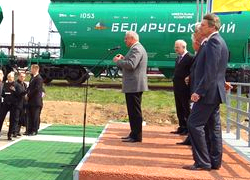Uralkali executive denies talks with Belaruskali about restoration of sales alliance
- 4.11.2013, 12:57
- 3,502

Uralkali has not held talks with Belaruskali about the possible restoration of their trade alliance.
Oleg Petrov, the Russian potash giant’s chief of sales and marketing, said it in an interview with Bloomberg.
He noted that Uralkali had “tried hard” to prevent the break-up of Belarusian Potash Company (BPC). “It became difficult to sustain it lately, as the whole industry rushed to fight for market share, to the detriment of both customers and shareholders. We are surprised to read comments from some people in the industry who, by their own actions, facilitated this crisis,” he said.
The executive said that Uralkali’s sales had picked up since the break-up of the alliance with Belaruskali this past July. “Markets have recovered and are no longer paralyzed,” he said.
According to Mr. Petrov, Uralkali’s new strategy is working. “We sold about 850,000 tons of potash in September and ended up with about 900,000 tons in October.” About 200,000 tons of October’s sales were to India, with a similar amount to Brazil. Uralkali also sold about 150,000 tons in Russia and had “good volumes” to China by rail and sea, he said.
The Russian company reportedly agreed to sell potash to India in September for $375 a metric ton, 12 percent less than a sales agreement BPC signed in February.
“This doesn’t necessarily mean that we are the only company in the world who is selling now,” said Mr. Petrov.
Brazil purchased about one million tons a month during its peak period of September and October, he said. Winning sales in Brazil is a competition with suppliers from Canada, Israel and Germany, with Belarus the only major producer without market share, he stressed.
Mr. Petrov predicted that next year the global demand for potash would “definitely grow, and may reach 58 million tons to 60 million tons.”
In July, Uralkali announced that it was quitting Belarusian Potash Company, a move that sent global potash prices down. The Belarusian authorities reacted angrily, arresting Uralkali CEO Vladislav Baumgertner during his visit to Minsk at the invitation of Prime Minister Mikhail Myasnikovich and instituting criminal proceedings against more Uralkali executives and the Russian company's top shareholder, Suleiman Kerimov.
On October 21, Alyaksandr Lukashenka criticized Uralkali for selling potash at a too low price, but said that Belarus would be eager to have its sales alliance with the Russian company restored.
Speaking to CIS media leaders in Minsk, the Belarusian leader said that Uralkali’s sales policy was harming the company itself. "The only thing that worries me is when they will stop dumping their goods and thereby ruining their manufacture of potash in Russia," he said.
According to Mr. Lukashenka, customers that agree to buy Belaruskali’s potash at $400 per ton are later offered by Uralkali to buy its potash at $320 or $350 per ton.
He expressed certainty that Belaruskali would withstand competition from Uralkali. "Why are you working at a loss? Do you want to win markets? You won’t manage to. We, of course, can agree secretly with all companies operating in the market, and you will fail to cope with the common market," he warned.









